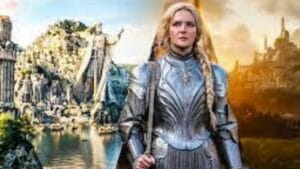Some are apprehensive that Amazon’s Lord of the Rings: The Rings of Power will diverge too much from Tolkien’s writings after the unveiling of a trailer and character posters, but these alterations are beneficial to the series. The forthcoming Amazon series, which has been kept under wraps, concluded filming in August 2021, with the very first episode planned to debut on September 2, 2022. Rings of Power will replace the fantasy need left by the end of Game of Thrones, and it has a similarly large budget, with the studio reportedly investing $1 billion to secure the show’s success.
The series will be based in Middle Earth, which was previously thought to be impossible to film. In the early 2000s, this was disproved by Peter Jackson’s Lord of the Rings trilogy, which introduced fans to the author’s renowned settings such as the Shire, Rivendell, and Mordor. When Peter Jackson returns to Middle Earth with The Hobbit trilogy over 10 years later, most of these were revisited. Despite not being as critically acclaimed as its predecessor, Jackson’s second trilogy of films shows a continuing interest in the Middle Earth narrative, which will be bolstered with The Rings of Power.

The plot of the impending Amazon series has remained a mystery, but the teaser, which looks strikingly similar to Jackson’s original LotR films, suggested some narrative elements that have alarmed some Tolkien fans because of how the source material appears to have evolved. These adjustments, on the other hand, are beneficial to the series and should not be viewed as a burden to the future episode. Given how previous adaptations of Tolkien’s work have varied from the source material as well as the constraints of different mediums, The Rings of Power is correct in not attempting to recreate the source material to the letter.
The Rings Of Power Must Not Rely Too Heavily On The Lord Of The Rings books
Many people appear to be concerned about the planned series’ alteration of Tolkien’s timeline and the creation of new characters. Despite rumors that the Amazon show would be based on Tolkien’s The Silmarillion, the studio has verified that it has the licenses to the additions from The Lord of the Rings and The Hobbit series. These parts outline the basics of what occurred in Middle Earth’s First and Second Ages in bullets point form, quitting the show with the broad strokes of the time and opportunity to fill in the details.
Tolkien’s study of the Second Age, the time frame in which the Amazon show will be set, spans thousands of years, but the show will condense the events into a much shorter timeframe. To follow Tolkien’s timetable, each series will have to span hundreds of years, with important characters dying off at an alarming rate. This could alienate people who haven’t read the novels and put too much emphasis on the series’ difference from the Lord of the Rings films. The show has a lot of information to cover, even if it simply uses the appendices, and condensing it into a shorter time period with new characters would help favor clarity and narrative over precise fidelity.
It Is Impossible To Create A Perfect Adaptation Of The LOTR Books
The concerns of Amazon’s possible adjustments ignore the underlying problem with adaptation: the influence of words on a page is unmatched by the usage of moving visuals. Jackson’s two trilogies perfectly summed up this sentiment, altering The Lord of the Rings books to reward the moviemaking medium and compressing the timeframe to retain a cinematic pace – a supposedly different technique than reading books, where the reader can choose how fast they want to enjoy the narrative. Because these scenes are challenging to make cinematic, the films have far fewer songs than the books – rare examples include Pippin’s song to Denethor, which is kept cinematic by close-ups of Denethor’s grotesque eating patterns and crosscutting to Faramir’s sacrificial attempt to reclaim Osgiliath.
The popularity of The Rings of Power cannot be based just on Tolkien’s literature. It is critical that the series make adjustments to the original appendices in order for it to stand on its own. The series may keep Tolkien’s origins of the Rings while avoiding being mired down in needless material by emphasizing storyline, character development, and action over historical truth. Lord of the Rings: The Rings of Power is not dishonoring Tolkien’s work by making these alterations to the text; rather, it is striving to convey the Second Age in a way that is both exciting and approachable.





